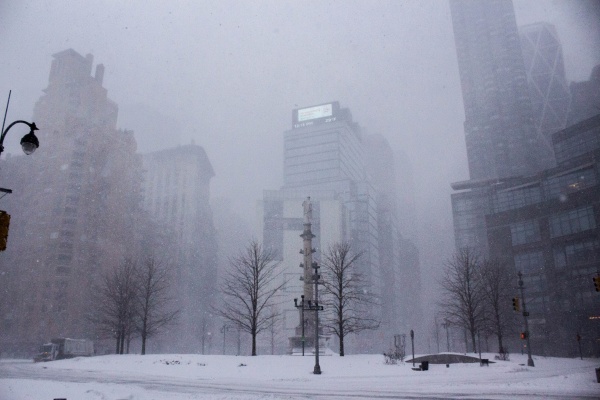Public Safety, Commuters Discuss Snow Concerns
February 10, 2016
Following the second worst snowstorm in New York City history, the Office of Public Safety decided to reopen Fordham on Monday, Jan. 25. Commuters voiced concerns that the university was opened too soon.
One main obstacle for commuters when deciding whether or not to come to Fordham following a severe snowstorm is the university’s attendance policy. Excused absences at Fordham are often solely reserved for family emergencies, religious holidays and illnesses with accompanying doctors’ notes.
John Carroll, associate vice– president of Public Safety, explained the university’s procedures when determining to close and reopen in light of snowstorms.
“We’re taking all of the sources of information that are available to us,” Carroll said. These sources include the Office of Emergency Management for New York, which “includes all of the MTA operations, buses, trains, local railroads, NJ Transit, etc,” according to Carroll.
“I personally went down and looked at the campuses on Sunday because it was such a heavy snowstorm, particularly 26 inches in the Bronx, where there’s a lot of pathways and roadways,” Carroll continued. “I spoke to everyone at Lincoln Center to make sure all of the walkways were done, everything was clear and there were no problems with it. At Rose Hill I also made sure the campus was ready to go.”
Carroll said that the delays in frequently used transportation services such as the LIRR were closely monitored. He added that these delays were part of the reason why the Office of Public Safety waited until 6 p.m. on Sunday to decide to reopen the university.
“We had to see if they’d be up and running in the morning,” Carroll said. “They said they couldn’t do full service, but they could do some service. The one thing when we’re making all of these decisions is to figure out if we can get all of the students, faculty and support people there and make sure the school is running and functioning.”
“Just because we open doesn’t mean that an isolated person who has a specific event in Queens, Long Island, Staten Island or wherever might not be able to get to school,” Carroll continued.
“That doesn’t mean we’re going to shut down the whole school. As we say in all of our alerts and bulletins, every individual has to take into account local conditions and make that determination. For example, there were some streets in Queens that weren’t even plowed until Wednesday and Thursday morning. We would never be closing Fordham because a student was in the unfortunate position of living on one of the streets where the plow hadn’t come through.”
Carroll said that the procedure to close the University in the face of a snowstorm is similar. This procedure involves consulting the same sources, as well as bringing together an emergency management team including members from the Rose Hill, Lincoln Center and Westchester campuses. This team in turn discusses the effects of closing the university, particularly on “academic affairs, the academic deans, undergraduate and graduate schools, our IT and our facilities people because they have to stay over the weekend and clean the place up so we can prepare and open as fast as we can,” according to Carroll.
“All of [the] students, faculty and staff should know that we put [in] a tremendous amount of effort, and it takes us hours to look at all of these different pieces of information to make sure that we are opening a very safe and secure facility for our students, faculty and staff,” Carroll said, regarding all of the procedures. “There’s a lot of work that goes into this. It’s not just watching a television channel.”
Carroll also stated that “we all at Fordham should recognize that in the last week with this blizzard, there were many employees of Fordham University who gave up time with their own families to serve the Fordham family, and I’m specifically talking about my own public safety officers, the Sodexo people who were there to feed our students on the campuses and the facilities people who worked for 20 hours straight just shoveling the campuses.”
The Commuting Students Association (CSA) did not comment in time for publication.
Shimul Habib, Gabelli School of Business at Lincoln Center (GSBLC) ’19, said that he encountered train delays of “over a half hour” on his way to campus from his home in Queens.
Carol Jeong, Fordham College at Lincoln Center (FCLC) ’19, was not able to come to the university at all on Jan. 25, due to heavy amounts of snow in her hometown of Mahwah, N.J.
“I got over 20 inches of snow,” Jeong said. As a theater major, she had rehearsal on that day, but said that “my teachers were so understanding and made an exception for me because I live an hour and 30 minutes away.”
“And I saw on the Facebook page that there were several students who were having major complications in getting to school on time,” Jeong continued. She did recognize, however, that “the university of course has to continue our education and can’t make exceptions for individual students.”
Currently, nearly half of the Lincoln Center campus’s 1,800 undergraduate students are commuters, according to CSA.
Given the plans and procedures in place, it appears that although they keep the university running and the members of the community safe, some commuters will continue to be adversely affected more than others in the case of significant snowstorms.
Jeong said, “I think the overall sentiment is that while the school may be open, for some commuters it’s going to be very difficult for them to make it into school.” She continued, “So I think if a student lets a professor know that they can’t come due to the weather, they will and should be totally understanding.”










